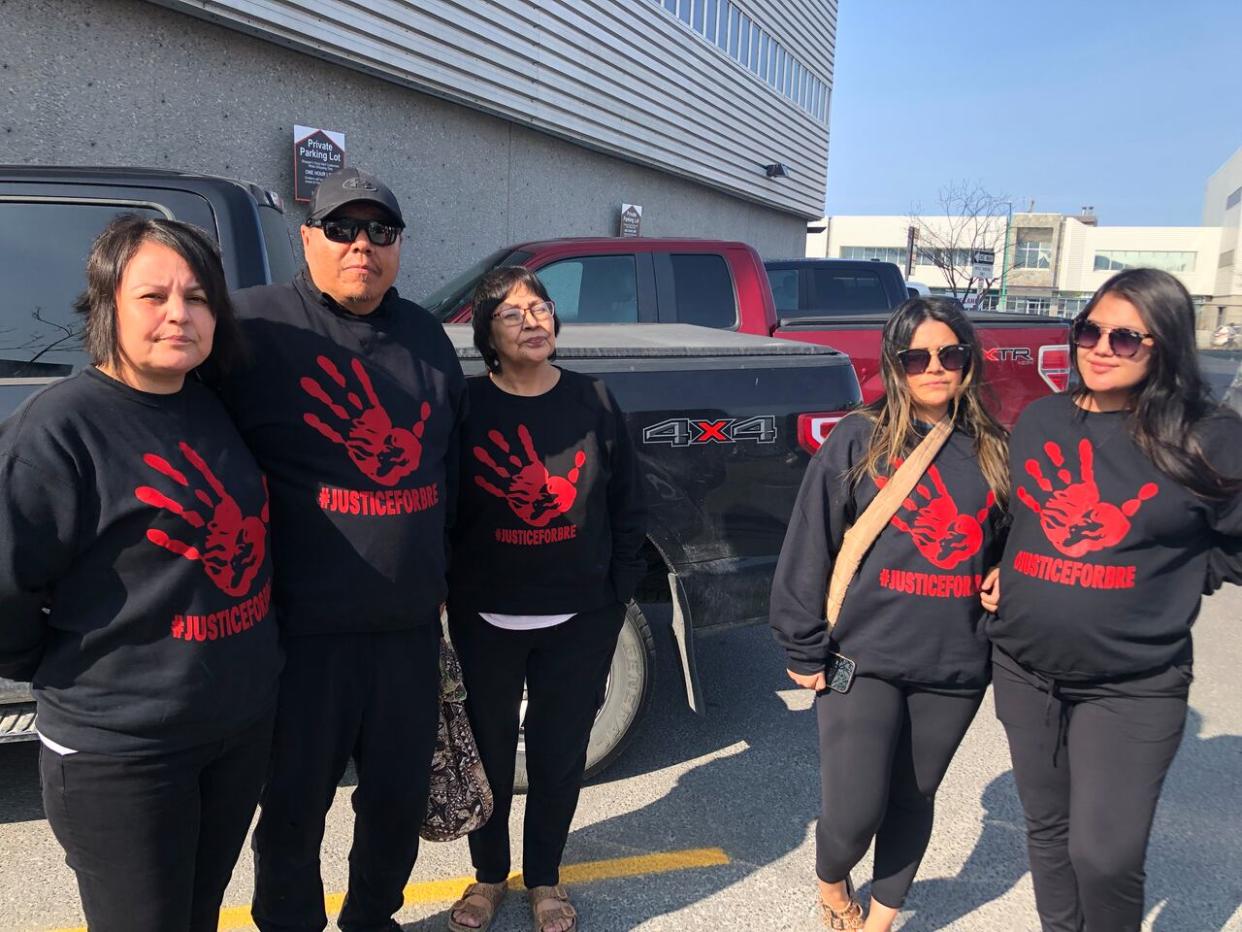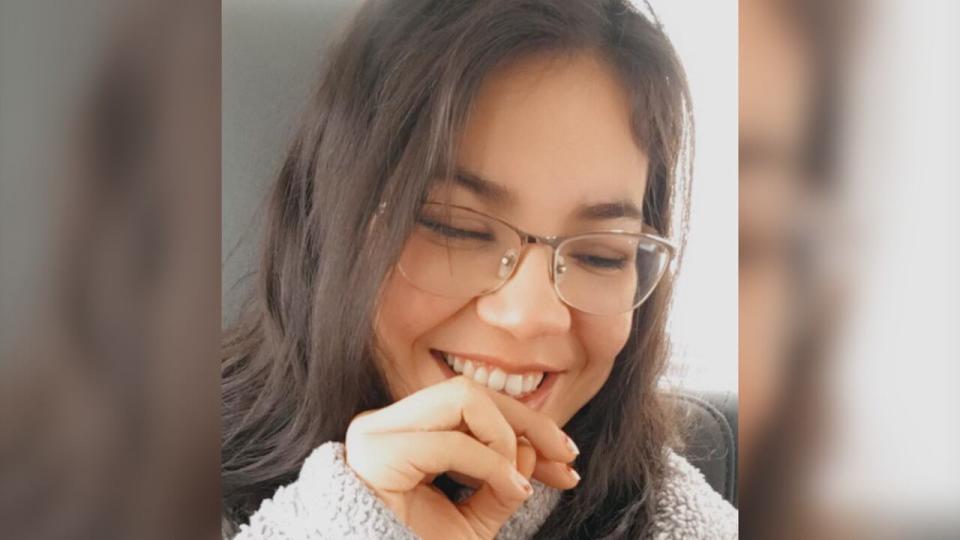Devon Larabie sentenced in N.W.T. court to life in prison for murder, eligible for parole in 6 years

WARNING: This story includes details that may be disturbing.
An N.W.T. man who pleaded guilty to murdering an innocent woman for unknown reasons and then attempted to hide the remains was sentenced to life in prison on Thursday.
Because of credit of one day for each day on remand, he will be eligible for parole in six years.
Devon Larabie pleaded guilty to second-degree murder in Menacho's death in November 2023 after being arrested in May 2020.
That was just before his third scheduled trial was set to begin. The first two were delayed after he fired his legal counsel on both occasions.
Crown and defence lawyers submitted a joint sentence for Larabie to serve life imprisonment with no eligibility for parole for 10 years.
Crown lawyer Blair MacPherson said it would have been difficult to take the case to trial. For one, when the police found Menacho's body in Larabie's apartment, they did so without a warrant. There were also five witnesses in the case, but only one was able to testify, and that one witness was experiencing serious mental health issues as a result of the event.
In addition to those issues, a trial would have been difficult for the family members, to have to relive the trauma of the event.
Justice David Gates accepted the sentence, citing that the sentencing judge is required to accept a joint sentence unless it is "so unhinged" that its acceptance would lead people to believe the functioning of the justice system would break down.
Gates noted "while this is not necessarily the sentence I would've imposed" he found it fair considering the mitigating factors, including Larabie's difficult upbringing.
Gates also acknowledged the failings in the court system for taking so long with Larabie's case.
"Resolving matters quickly is important, but resolving matters fairly is also important," he said.
"We need to do better."
Menacho 'made you feel safe'
A dozen victim impact statements described the late Breanna Menacho as a kind, empathetic, giving person, whose life was cut short after a random and inexplicable act of violence.
Sitting at the back of the courtroom was a group wearing black T-shirts with a red hand print and "#JusticeForBre" written on them.
Lisa Zoe, Menacho's mother, was one of them.
Reading her victim impact statement to the court, she said Menacho "had a way about her that made you feel safe."
She said her daughter, who grew up in Edzo and Yellowknife, was a soccer player who travelled many places for the sport. She had lots of friends and was known for giving hugs.
"I could go on for days," she said of her daughter's qualities.
A former teacher of Menacho's, Jacqueline Stanbridge, said she remembered when her former student would pick her up on her little snowmobile.
She said she was a supporting and loving student and she still sees her in her current students.
David Menacho, Breanna's father, travelled from Tulita for the sentencing.
He submitted a written victim impact statement, which described the "unimaginable suffering" he had his family have been dealing with since the loss of their daughter.
In his statement, David Menacho asked what she did to deserve this?
Larabie, who admitted to killing Menacho with a hatchet, sat in the courtroom in a blue suit, staring straight ahead as the victim impact statements were read.
Zoe, Menacho's mother, also requested that Larabie not be allowed to return to Yellowknife after his sentence. She said her biggest fear is one of her children running into him on the street.
She also drew attention to a Facebook account that Larabie created while in remand.

Breanna Menacho's said her daughter, who grew up in Edzo and Yellowknife, was a soccer player who travelled many places for the sport. (Breanna Menacho/Facebook)
A post from May 2023 on his account says "Can't wait to get out of this shit-hole jail ... best be ready for round two."
Zoe said although Gladue factors must be considered in the sentencing, she asked "what about the Indigenous victims and their families?"
Larabie 'haunted by shame and guilt'
Larabie addressed the court on Thursday before the sentence was read by Gates.
"I've been thinking about this day for four years," he said.
"I am truly sorry ... I'm haunted by shame and guilt."
Larabie described himself as a "failure" and said he hasn't been the same since that night.
He said he feels for Menacho's family and decided to plead guilty to take accountability for his actions.
"The sentence that I am given will make me a better man," he said.
'This just doesn't make sense'
Although he accepted the sentence, while the submissions were being presented, Gates, the judge, did take issue with several assertions.
Gates said the randomness of Menacho's murder makes the case difficult to understand.
MacPherson, the Crown attorney, acknowledged that it was gratuitous violence.
"This just doesn't make sense why this happened," he said.
According to previous testimony, Menacho was sitting beside Larabie when he suddenly killed her.
Larabie's defence lawyer Michael Spratt argued that the randomness of this made it better than if there was a reason for it.
This was something Gates took serious issue with.
"In some ways that makes him more dangerous," he said, adding Larabie has a history of violence, getting into fights in the school yard and into fights while at the correctional centre.
Spratt also argued that the fact Larabie pleaded guilty should carry some weight for the sentence.
He said pleading guilty saves the court resources and prevents victims from having to relive the trauma in a trial.
"Without pleas of guilt our court system would grind to a halt," Spratt said, adding that the guilty plea is an acceptance of responsibility.
But Gates said this was "not what happened here."
"This was trial number three," he said, adding that there is a difference between an early guilty plea and a late one.
Spratt also argued that Larabie has been trying to better himself after struggling with addiction.
Gates again took issue with this assertion, citing the pre-sentence report which found Larabie was using heroin while in custody. Gates said that Larabie admitted in a pre-sentence report that he would likely use drugs again when he is released.
Spratt said that Larabie is acknowledging his struggles with drugs and wants to recover.
The back and forth became heated at some points with the judge calling for a sudden adjournment.
Spratt argued there were other mitigating factors including Larabie's difficult upbringing, including fetal alcohol syndrome and abuse he suffered at the hands of his foster parents.
A difficult upbringing
In the end, Gates said these were mitigating factors that made the sentence fair.
He described the abuse that Larabie faced throughout his childhood to be horrifying. It included physical, mental and sexual abuse.
Gates said Larabie's survival and completion of high school and employment skills is a tribute to his, "determination and resilience."
The verdict didn't set well with everyone in the gallery. At one point, a person stood up and said, "Excuse me judge, is this about the murder trial or is this about him?" before walking out of the room.

 Yahoo News
Yahoo News 
